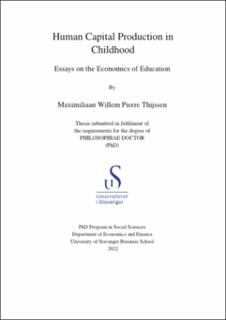Human Capital Production in Childhood: Essays on the Economics of Education
Doctoral thesis
Permanent lenke
https://hdl.handle.net/11250/2995927Utgivelsesdato
2022-05Metadata
Vis full innførselSamlinger
Originalversjon
Human Capital Production in Childhood: Essays on the Economics of Education by Maximiliaan Willem Pierre Thijssen, Stavanger : University of Stavanger, 2022 (PhD thesis UiS, no. 647)Sammendrag
The skills demanded in the labor market have changed (see, e.g., Acemoglu & Autor 2011).1 Just as technological innovations have increased demand for workers capable of performing non-routine and complex tasks, demand for routine work has declined (Autor et al. 2003, Spitz-Oener 2006). Since lifelong learning can help individuals develop resilience and adapt to adverse shocks in changing labor markets, it is important to learn more about the best ways to support such learning.2
Skill formation starts in childhood, as does lifelong learning. By investing early, and with the support of teachers and caregivers, we can equip children with a strong foundation for further development (National Research Council Institute of Medicine 2000). Societies can invest in skill formation by improving the quality of children’s environments. Indeed, the home environment, early childhood education and care (ECEC) centers, and schools can all affect children’s skill formation (Almond & Currie 2011, Blau & Currie 2006, Cunha et al. 2006, Hanushek & Rivkin 2006, Heckman & Mosso 2014). This influential role of the environment has implications for policy because it suggests a role for investments that enhance its quality. Yet gathering evidence on environmental factors that affect skill formation is no simple task, and much remains to be learned about the relevant processes.
This thesis focuses on three key questions: First, what is the best way to gain a better understanding of how children acquire new skills? Econometric tools have been developed to evaluate the effectiveness of environmental factors that affect skill formation. However, these tools cannot be employed unless children are observed at equally spaced intervals. Second, which of the many possible skills should investments focus on? During early childhood, it is best to target skills that promote a child’s further development, and in the context of the crucial transition from preschool to primary school, these could be skills that help prepare children for success in school. Third, once certain skills have been nurtured during early childhood, how can we provide effective education to sustain and build on this foundation? Although we know that teachers play a key role in education, much remains to be learned about what makes teachers effective. By addressing these questions, this thesis seeks to deepen our understanding of the processes driving skill formation in childhood, yielding new and better insights into public policy design.
Utgiver
University of Stavanger, NorwaySerie
PhD thesis UiS;;647
